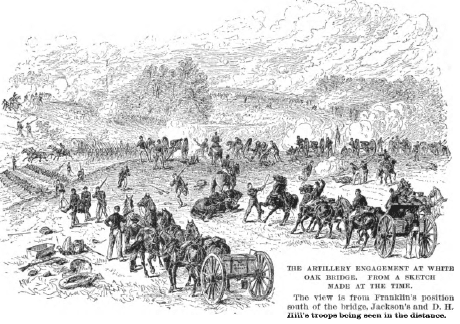In the Rifle Pits
Narrow Escape #11
Ironton Register 27 Jan. 1887
Submitted by Peggy Wells
John E. Stewart, of Symmes township, was a member of Co. G. 53d O. V. I. Capt. Geo. K. Hosford’s company. His allusion to his old Captain, which was warmly complimentary, brought on the talk, which finally wound up with some of his army experience, which we propose to weave into a “Narrow Escape.”
“It was in front of Atlanta in the Summer of 1864, where we boys had a pretty tough time and many a big scare. The rebs had their lines of protection around Atlanta in pretty good shape, and so our troops invested it slowly and cautiously.”
“Our command occupied a gentle ridge and was protected by the summit. The rebel line was stretched along a parallel ridge, just opposite, probably, about 300 yards. The rebel sharpshooters held the valley between. Our skirmish pits were just over the ridge that our line occupied and about thirty yards ahead of it.
“These pits were holes in the ground, about 15 feet long. The dirt was thrown up in front, and on the dirt, rails were laid so as to form little port holes. Each of these pits was occupied by ten or twelve soldiers. A profile of the way the land lay is thus shown: (note: please draw a semi-circle between line dashes to get the effect of the diagram in the paper.)
______ ___________ _____
“a” shows our line; “b” the skirmish pits; “c” the rebel sharpshooters; “d” the rebel line.
“The skirmish pits were dangerous places. Many a soldier lost their life there. They were well arranged for protection, but the reb. sharpshooters got the hand of watching the little port holes, and as soon as they would see a shadow move across one, which was sure proof of some of us peeping, a ball from a reb. rifle already aimed would strike pretty close if it did not perforate some poor head.
“One day, while I was watching the chance to off some rebel across the valley or among the sharpshooters, and I was mighty careful not to fill the entire porthole with my head, “zip” cause a bullet and struck the rail just above my cranium. My! but I was scared, and I fell back and quivered as if a ball had gone right through me. It was some time before I could muster up the courage, to take a peep at that port hole again.

“Sometimes, the rebels would make a dash on our skirmish pits and capture the boys. They would attempt this generally, at night, when they could creep up through the timber and undergrowth close to us. To obviate this, our forces would put out sentries, some 30 steps in advance of the skirmish pits, to raise the alarm if the rebs gathered to make a rush on the pits.
“One night about eight o’clock – when it was pretty dark – I was detailed as sentry and left the pit on the hazardous mission. I advanced about thirty steps, as quietly and stealthily as possible, expecting every moment to meet a reb, or a bullet from him.
“It was quite dark, and I thought it well enough to seek the assistance of some friendly shadow or accommodating obstacle to assist me in keeping the watch with safety to myself as well as efficiency for the service; and so, after feeling and crawling around some time, I came upon a little bunch of sumac or sassafras, which was no protection, but the mere outline of one, for a night watch.
“So, I began bestowing myself as quietly as possible behind that bush, letting myself down easily, and straightening my legs for a night’s watch; but just at the critical moment when silence was worth a world to me, I ran my foot against a stick which broke and snapped like a young pistol.
“Immediately, bang, bang, bang, went rifles in front of me, and the balls whizzed and struck all around me. I thought I was gone, in fact, I did go, but it to the skirmish pits – helter-skelter, racehorse speed, I skipped those thirty steps and into the skirmish pit, like a prairie dog into his mound. There must have been fifty balls struck around that rifle pit just as I jumped into it.
“How the boys did laugh! And how I enjoyed it too, then; for I laughed with them most heartily. I could afford to laugh, for my “Narrow Escape” had doubtless saved an attack on the pits, for the rebs were certainly gathering for that kind of job.
“I may mention here that going from the line to the pits (a to b in the diagram) was a perilous performance. Many a brave soldier fell while rushing across that open space. I remember John Gossett, who lived in this county, was shot in the head and killed while running from the line to the pits.”
“That is a very interesting experience, Mr. Stewart,” said the reporter. “Were there other boys from this county in the pits beside yourself?”
“Yes,” he replied, “I think John or Charley Earles was in the pit the night I rushed for it so heartily.”

0 Comments